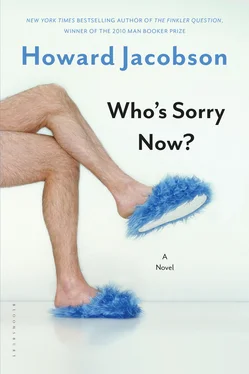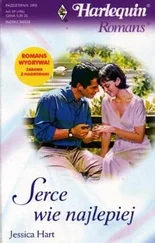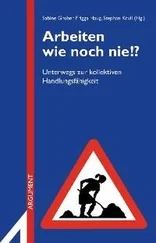He wasn’t sure whether Chas had seen them. He didn’t want Chas to have seen them. It would be worse for her, he believed. Pretending to be interested in whatever was happening on the bandstand, just kids doing wheelies on their bicycles, he steered her in that direction.
But he couldn’t so easily steer his conscience away from what he’d thought. I owe her, he told himself. For that fleeting involuntary infidelity, I owe it to her to love her twice as hard and twice as long. But how long was twice as long when he’d already been contemplating eternity? He felt the tears squeezing into his eyes. He knew what he would be thinking next — he would be thinking that if anything happened to Chas he would not be able to survive. There was the grave, there was the coffin, and there was he, Marvin Kreitman, throwing himself down upon it.
She felt him giving way to pathos. ‘What’s the matter?’ she asked.
‘Nothing,’ he said. ‘I’m just thinking that I couldn’t live without you.’
She threw him a half-grateful, half-beseeching look. ‘Isn’t it a bit soon, Marvin, to be thinking that?’
He simultaneously nodded and shook his head. Yes and no. But in the end it was all about this, wasn’t it? You made the leap, or you didn’t. Love was the decision to make the leap.
She put her arm round his shoulder. He liked that. He liked her having the confidence to encircle him, to take him away from where he’d been. Surreptitiously, she upped the pace; then she said, ‘Right, swing your arms,’ and soon she had him striding across the grass, invigorated, without a morbid thought in the world.
And had Hazel or Charlie seen them? Unlikely. Charlie rarely noticed anything when he was out walking and Hazel was enjoying herself too much to raise her eyes to other people. As a rule Charlie gave her good Sundays, unlike Kreitman who made a purgatory of the day of rest, whatever the weather. She could never get any nature with Kreitman, that had been her main complaint. He wouldn’t allow her to forget the human world. Charlie, on the other hand, almost reminded her of a tree, so green and frondescent-smelling was he, so abundant and protective. Today he’d been making up stories for her as they walked. Nature stories, full of sap. Stories she could squeeze and which left the juice of berries on her fingers. Which Charlie could lick clean.
Once upon a time, Hazel-Mouse Hyphen Hazel-Worm was walking in the woods with Charlie Hyphen Smelly-Botty Farnsbarns when they came upon the good witch Cantilever Hyphen Thumbelina Fucklebum stirring juices in an iron pot. ‘What are those juices you are stirring, Cantilever Whatever Your Name Is?’ Hazel-Mouse enquired. ‘Why my dear,’ replied the good witch, ‘these are the juices of unhappiness. Sourness, jealousy, maliciousness, regret, and not remembering to be kind to Charlie Hyphen Smelly-Botty. If I can boil all these juices away I will have made Felicity Soup. Have you ever tasted Felicity Soup, my little one?’ Hazel-Mouse shook her head. ‘Then you just sit here and put your arms round Charlie Hyphen Smelly-Botty and give him lots of kisses while I go on stirring, and if the angels are with us you’ll get to taste Felicity Soup tonight.’
Hazel snuggled into him, for protection and shade. Who cared who else was crossing the Common that day?
So everyone on planet Nice is happy, then?
And the children?
And Nyman, without whom, in all fairness, so much happiness might never have been spread abroad?
In the days before he was caught up quite so intimately in their fate, Kreitman had not been above firing the occasional cheap shot at the Merriweathers’ example of parenting — semi-pseudonymous writers of (at one time) highly successful self-improvement novels for children age category 11–14, parents of actual children who were going to the dogs.
Like yours, Kreitman?
He wouldn’t have denied it. Just like mine. Only I’m in purses, not in children’s books. I expect children to go to the dogs.
In fact — had Kreitman been talking facts — the C. C. Merriweather books were not quite as anodyne as he imagined them. True, the Flying Away series of which Kreitman disapproved, all questions of content aside, purely on gerundival grounds, suffered from being too obviously post Peter Pan. It was Charlemagne who had planted the seed, telling Mrs C. C. Chassyboots during the interval of a performance of the play that he too, as a boy, had tried jumping off the wardrobe.
‘To see if you could fly, Charlie?’
‘To see if I could commit suicide.’
Not long after that, they together hit upon the idea of talking the world’s children down from their wardrobes by reminding them that there were other ways of flying. Becoming a pilot, for example. Or an air hostess. Or an astronaut. Or a balloonist. Or First Girl on the Moon — the fastest seller of the lot.
‘What about bungee jumping next?’ their editor wondered. After thinking about it, they arrived at a mutual decision that bungee jumping was more about not hitting the ground than taking to the air, wasn’t strictly speaking a profession, and wasn’t really something they felt they ought to be encouraging their young readers to try.
In this, Flying Away was not typical of the C. C. Merriweather books. Normally they took greater risks. Slightly greater risks. While other children’s writers were banging out their myths and fantasies, their legends of Ungala, their spook stories and sagas in the manner of The Hobbit , the Charlies stuck to their guns and wrote about what they called real kids living now. They tackled race, venereal disease, depression, drunkenness, drugs, Aids, illegal immigrants and even, latterly, affairs between schoolchildren and their teachers. They weren’t comfortable writing about poor kids — never having met any — and they knew there was only a limited fantasy market for books about rich kids, so they pitched it somewhere in between, inventing little classless striplings who never smoked or swore but knew where smoking and swearing were to be found, and little sexless hoydens who were never once penetrated no matter how far they allowed relations with the head of geography to go. ‘Goodbye,’ the relevant member of staff always lamented on the last page, ‘I will never forget you or what you have taught me.’ Moral? Goodness is its own lesson. And you don’t have to give away everything to make a lasting impression.
There was the problem: the C. C. Merriweathers weren’t excessive enough for the children for whom they thought they wrote. Some critics believed they’d been losing their touch and their audience for years. Others admired them for not taking the easy route of witchcraft and horror. But all of that went for nothing anyway when, out of nowhere, old-fashioned owl-eyed boys with secret powers flew back with a vengeance on a magic broomstick.
What price depression in a suburban comprehensive now?
As for the Charlies’ own real-life children, they were no more going to the dogs than anybody else’s. So Tim had been on Blind Date and now fantasised about getting on Big Brother? From whom, under the age of twenty-five, did that significantly mark him out? And with regard to Kitty the bulldyke — a) she was no such thing, the bull part being a fiction entirely of her father’s making, the extravagance of the word and the activities it denoted having caught his fancy; and b) a little light dykery was de rigueur, if not by now all but passé, among girls of her class and generation. Kreitman wouldn’t have known because he never went to such places, but girls experimentally making out with girls was a commonplace in every clubbing venue in the country. His own daughters could have told him that.
Читать дальше












